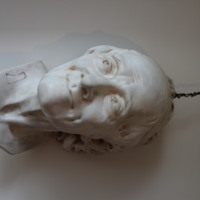Fetherston and Philosophy
Edith Fetherston’s philosophy education overlaps with her interest in gardening. In the notes that she prepared for a radio interview in May of 1933, she explains the original purpose of the garden in relation to painting. Fetherston also had a keen interest in Voltaire’s writings, she hung a bust of him in the study on the far wall overlooking the garden. Fetherston said that she like to have him “watch her gardening.” As she had studied philosophy Fetherston most likely read Voltaire’s Candide written in 1759, in which he writes, “that we must take care of our garden.” “You are in the right,” said Pangloss; “for when man was put into the garden of Eden, it was with an intent to dress it: and this proves that man was not born to be idle.” “Work then without disputing,” said Martin; “it is the only way to render life supportable.”
